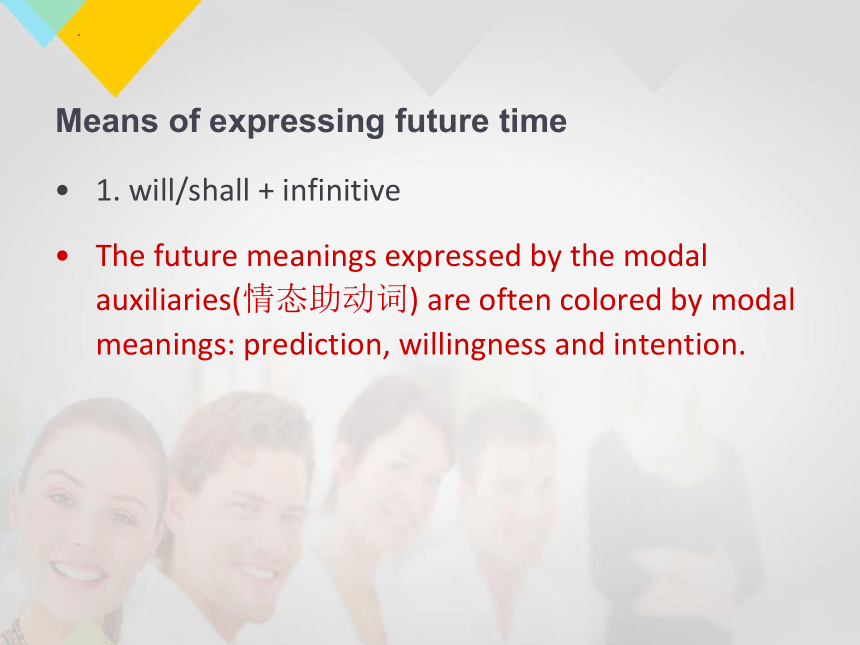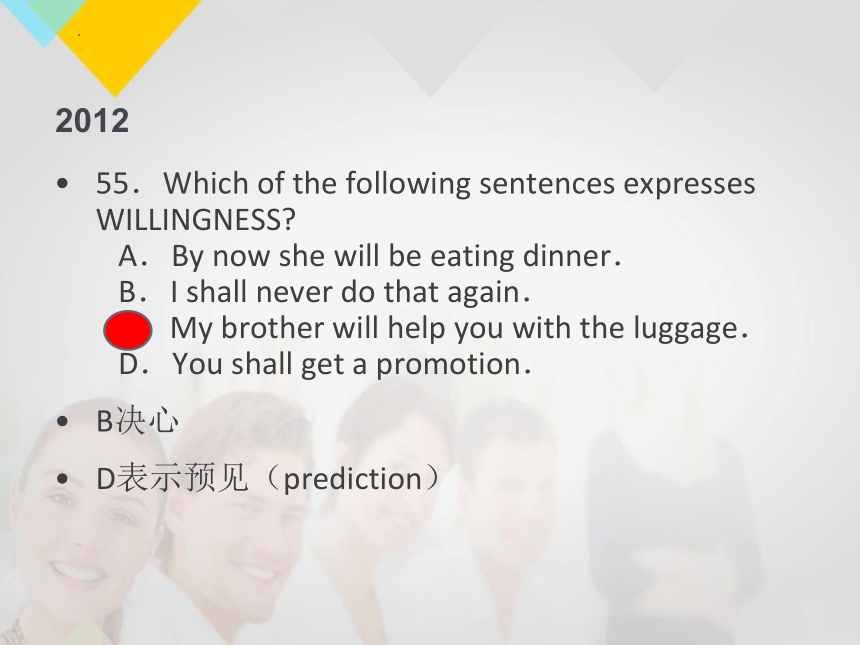2023届高三英语一轮复习:将来时间表示法课件(11张ppt)-
文档属性
| 名称 | 2023届高三英语一轮复习:将来时间表示法课件(11张ppt)- |  | |
| 格式 | pptx | ||
| 文件大小 | 632.2KB | ||
| 资源类型 | 教案 | ||
| 版本资源 | 通用版 | ||
| 科目 | 英语 | ||
| 更新时间 | 2022-11-13 19:21:13 | ||
图片预览





文档简介
(共11张PPT)
Consolidation Activities- Vocabulary main
Vocabulary
Grammar
Translation
Integrated skills
Oral activities
Writing
Listening
Modal auxiliary + infinitive
“Be going to” and “will”
Hypothetical past
2. “Be going to” and “will”
We can use either “will” or “be going to” to talk about something that is planned, or something that we think is likely to happen in the future.
Consolidation Activities- Grammar7
Vocabulary
Translation
Integrated skills
Oral activities
Writing
Listening
Grammar
Means of expressing future time
1. will/shall + infinitive
The future meanings expressed by the modal auxiliaries(情态助动词) are often colored by modal meanings: prediction, willingness and intention.
2012
55.Which of the following sentences expresses WILLINGNESS
A.By now she will be eating dinner.
B.I shall never do that again.
C.My brother will help you with the luggage.
D.You shall get a promotion.
B决心
D表示预见(prediction)
2. will/shall + progressive/perfective infinitive
a colourless, pure future
e.g. I will be waiting for you in the office this evening.
I'll have finished my work by five this afternoon.
By the end of this term she will have been studying English for seven years.
3. be going to + infinitive
Intention
be going to: a premeditated intention
will: unpremeditated intention alone
speaker's feeling of certainty
Consolidation Activities- Grammar8
e.g.
I’ll pick him up at 8. (an offer; making an arrangement now)
I’m going to collect the children at 8. (this was previously arranged)
4. be + -ing
used to to talk about things that we have already arranged to do in the future. Some of the verbs use “the present progressive/ the present continuous” to show the future tense, such as leave, go, come, live, arrive and so on:
e.g. I’m seeing Julie at 5 and then I’m having dinner with Simon.
He’s picking me up at the airport.
5. be to + infinitive
a future happening based on a plan or arrangement
e.g. What are you to do tomorrow
1. James has just arrived, but I didn’t know
he until yesterday.
A. will come B. was coming
C. had been coming D. came
B
2. The committee has anticipated the problems that ___ in the road construction project.
A. arise B.will arise
C.arose D. have arisen
B
3. _________ conscious of my moral obligations as a citizen.
A. I was and always will be
B. I have to be and always will be
C. I had been and always will be
D. I have been and always will be
D
Consolidation Activities- Vocabulary main
Vocabulary
Grammar
Translation
Integrated skills
Oral activities
Writing
Listening
Modal auxiliary + infinitive
“Be going to” and “will”
Hypothetical past
2. “Be going to” and “will”
We can use either “will” or “be going to” to talk about something that is planned, or something that we think is likely to happen in the future.
Consolidation Activities- Grammar7
Vocabulary
Translation
Integrated skills
Oral activities
Writing
Listening
Grammar
Means of expressing future time
1. will/shall + infinitive
The future meanings expressed by the modal auxiliaries(情态助动词) are often colored by modal meanings: prediction, willingness and intention.
2012
55.Which of the following sentences expresses WILLINGNESS
A.By now she will be eating dinner.
B.I shall never do that again.
C.My brother will help you with the luggage.
D.You shall get a promotion.
B决心
D表示预见(prediction)
2. will/shall + progressive/perfective infinitive
a colourless, pure future
e.g. I will be waiting for you in the office this evening.
I'll have finished my work by five this afternoon.
By the end of this term she will have been studying English for seven years.
3. be going to + infinitive
Intention
be going to: a premeditated intention
will: unpremeditated intention alone
speaker's feeling of certainty
Consolidation Activities- Grammar8
e.g.
I’ll pick him up at 8. (an offer; making an arrangement now)
I’m going to collect the children at 8. (this was previously arranged)
4. be + -ing
used to to talk about things that we have already arranged to do in the future. Some of the verbs use “the present progressive/ the present continuous” to show the future tense, such as leave, go, come, live, arrive and so on:
e.g. I’m seeing Julie at 5 and then I’m having dinner with Simon.
He’s picking me up at the airport.
5. be to + infinitive
a future happening based on a plan or arrangement
e.g. What are you to do tomorrow
1. James has just arrived, but I didn’t know
he until yesterday.
A. will come B. was coming
C. had been coming D. came
B
2. The committee has anticipated the problems that ___ in the road construction project.
A. arise B.will arise
C.arose D. have arisen
B
3. _________ conscious of my moral obligations as a citizen.
A. I was and always will be
B. I have to be and always will be
C. I had been and always will be
D. I have been and always will be
D
